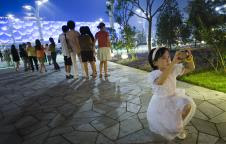
A young girl takes a photograph on the Olympic Green in Beijing after a rehearsal for opening ceremonies for the 2008 Summer Olympic Games on Tuesday.
BEIJING — They stroll through the vast expanse of Tiananmen Square, sipping from bottles of water, licking ice-cream treats, holding parasols to get the slightest relief from the withering temperatures.
Men and women, young and old, large family groups and hand-holding couples from all over China have come to Beijing just to say they were at ground zero for their nation's official coming-out party to the world.
Perhaps as many as a half-million citizens of the world's most populous nation will say they attended the 2008 Olympics even though they don't have tickets to get into any of the events.
"This is a time to feel the pride of China and to welcome the world to our home," said Jenny Wei, 29, a part-time interpreter from about 80 miles away in the Hebei province that surrounds the capital city. "There has for years now been interaction between China and the rest of the world. But this is the time for us to show all that we can offer, all that we can be."
At a time when so much of the lead-up talk to the Games has been about human rights conditions, the upheaval and crackdown in Tibet, the lockdown on the Internet and the hazy gloom of the heavy air pollution, many Chinese citizens are excited to see for themselves and to show off the giant strides their country has made, especially in the seven years since the Games were awarded to Beijing by the International Olympic Committee.
Taking the tour
They come first to Tiananmen, in the heart of the city, standing in long lines to enter the mammoth Mao Zedong Memorial, where the body of the late chairman of the Community Party is on display under a glass case 32 years after his death.
They take the pedestrian subway beneath the wide Chang'an Dajie to stroll through the grandeur of the Forbidden City.
Throngs jockey for position to take family photographs in front of the official Countdown to the Olympics clock that stands outside the National Museum of China.
Several miles away inside the Olympic Green, they point with pride and nod their heads in admiration at the Bird's Nest, the Water Cube and all of the other gleaming new structures that have been built for this occasion.
Tan Xiang is watching his 2-year-old son run in circles with a handful of other children while their parents stand patiently, waiting for the fireworks display that will culminate the final dress rehearsal for Friday's opening ceremonies and nodding their heads in awe at everything they see.
"This is a dream come true for the Chinese people," said Tan, 35, a software programmer from Shanghai. "To have the Olympic Games means China stands on the stage with all of the great powers of the world. This is the first Olympics for China and the hope can be that China will some day be host for as many Olympics as the United States. This year we are introducing Beijing to the world. But we have many other great cities that maybe you do not know."
At the Olympic Superstore on the Wangfujing shopping street, the building can barely squeeze in any more bodies as the racks of souvenirs, the shelves of T-shirts, jackets and hats are devoured as if by a cloud of locusts.
Alice Xijun, 32, who is a hostess at a hotel, has no tickets to any Olympic events, but holds an armload of official authorized paraphernalia to take home to her daughter, husband and assorted family members.
"We will wear our Olympic costumes when we watch the events on television and feel like we are a part of the celebration," she said. "On some nights, our family will go to a restaurant or a public place and watch the sports with our neighbors and know that seven long years of preparation has paid off."
The other view of Beijing
There are some areas of the city, some segments of the population that have been negatively affected. The government has wiped out entire hutongs, the narrow-laned neighborhoods of old Beijing. Many small businesses have been forced to close temporarily. In some cases, work crews simply arrived one day and erected fences that prevent some of the small, ramshackle structures from being viewed from the busy streets.
However, at the small, traditional market off Wangfujing, where longtime merchants haggle over prices with tourists for happy teapots, chopsticks and Chairman Mao wristwatches, and food vendors sell deep-fried seahorse and octopus on a stick, there is no Olympic merchandise, but a buzz in the air nonetheless.
"Come, my friend," said one vendor, reaching out from his stall to fill a passing visitor's arms with a large, round, brass statue. "A happy Buddha in your home is a memory of a happy China Olympics."
Wednesday, August 6, 2008
Proud nation plays host and tourist in transformed capital
Posted by ruby at 7:48 AM
Subscribe to:
Post Comments (Atom)


0 comments:
Post a Comment